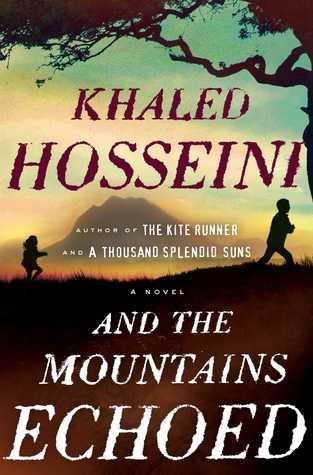Ten year old Abdullah and his li’l sister Pari travel from their village to the city of Kabul with Saboor, their father . Without the knowledge that only two of the three will be making the journey back home…
. Without the knowledge that only two of the three will be making the journey back home…
The book starts off pretty well. As a story of a brother and sister. And a father who, burdened by the drudgery that comes with being poor, decides to give his daughter away to a wealthy childless couple in Kabul, Suleiman and Nila Wahdati. This is facilitated by Nabi, Saboor’s brother-in-law and the children’s step-uncle. Nabi is employed by Suleiman as a chauffeur, cook and caretaker of the Wahdati mansion.
and caretaker of the Wahdati mansion.
The story spans from the 1930’s and ‘40s to late 2000s, with storylines skipping decades back and forth quite a bit. Pari was just three years old when she left her family, so as the years pass by, memories of Abdullah, Saboor and the rest of her family – her step-mother Parwana and half-brother Iqbal fade away. Nila and Pari leave Afghanistan and move to Paris a couple of years later. Nabi continues to stay at on, and after Mr. Wahdati’s death, rents out the mansion to international aid workers in early 2000 for free. One of them is Markos, a Greek plastic surgeon. Nabi addresses a letter to Markos to be opened after his death. In that letter, he narrates everything and unburdens his conscience by requesting Markos to find Pari and deliver the contents of the letter to her.
to stay at on, and after Mr. Wahdati’s death, rents out the mansion to international aid workers in early 2000 for free. One of them is Markos, a Greek plastic surgeon. Nabi addresses a letter to Markos to be opened after his death. In that letter, he narrates everything and unburdens his conscience by requesting Markos to find Pari and deliver the contents of the letter to her.
As I said, the book starts quite well. And Hosseini does weave in a diverse tapestry of characters. He devotes a few pages exclusively to pretty much all of them. All of them were interesting, well handled and well resolved. Each of them is shown grappling with moral dilemmas of choosing between right, wrong, convenient and obligatory. There is Parwana, who takes care of her invalid twin for years and part of the reason is to atone for the accident that she believes caused her sister’s current condition. So what prompts her to finally unmoor herself from that responsibility? And there is Idris and Timur, cousins and Wahdati’s neighbours, who return to Afghanistan decades later to claim ownership of their old house. Idris has always been slightly wary of Timur’s flamboyant “Americanised” self and garish display of his “helpful nature” by monetary assistance among his friends and the Afghan circle back in United States. He finds it hypocritical and pretentious. But when Idris gets a chance to be a hero in the eyes of an injured girl in a Kabul hospital, how well does he rise to the challenge of fulfilling his promise to her? There is Suleiman and Nabi, who over the years, end up forming a kinship out of shared loneliness. And Nila, who could never find the happiness and fulfilment that she thought would come if she completed a family with a child. And Markos, who leaves his tiny town of Tinos to travel around the world and help people to get medical aid.
aid.
Unlike Hosseini’s previous books, AtME starts decades before the foreign invasions in Afghanistan. There are references to loss of lives, people’s plight, infrastructure damage and lawlessness in this book too. But not in the detailed, personalised way that will make your stomach curl. Hosseini treads different themes, including some still perceived as blasphemous.
So what is my beef with the book? Well, I think the biggest problem I had with the book is that there are so many characters and each of them with their separate tracks that in the end, the book sort of lost focus on what it started out as. And the only thing all these characters had in common is their connection to Kabul. None of their lives ever really crisscross to affect anything at all.. heck, each of them could probably have spin-off books written in the future (Nila by herself deserves a separate one.. what a hauntingly tragic life!) . By the time the story veers back to Pari and Abdullah, I sort of lost whatever keenness I had to see them meet or reconnect again. It is my opinion that for a book to deliver some sort of emotional punch in the end, the rest of the book should have adequate “page time” devoted to the characters to build that rapport with them. Abdullah was pretty much absent through most of the book.

 Rating:
Rating: 

One thought on “And the Mountains Echoed – By Khaled Hosseini”